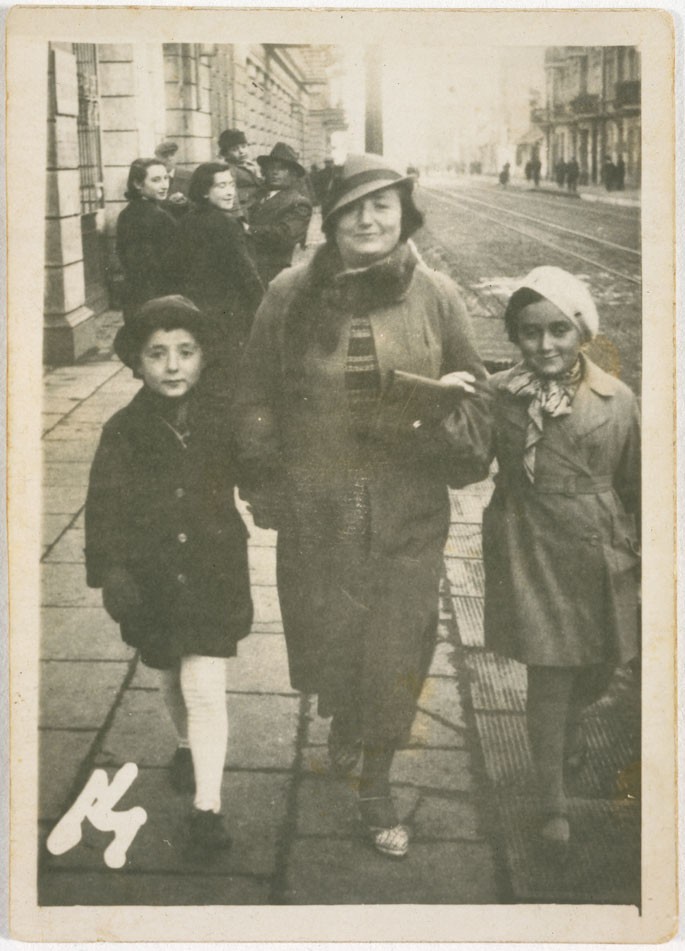
Jutta Szmirgeld
The Jewish children of Lodz suffered unfolding harsh realities after the German invasion of Poland. Some of the children, among them Jutta Szmirgeld, recorded their experiences in diaries. Their voices offer a view into the struggle of a community and its young to live in spite of the most difficult circumstances.
Excerpts
“The yellow badge was a kind of stamp. A stamp that distinguished me from the rest of the population. Anyone could approach me, tell me, do to me whatever they wanted.” —Jutta Szmirgeld, age 12
“It was forbidden to gather more than three or five people. It was punishable by death, but we were sometimes even fifteen teenagers, and we were then in Palestine for this hour with the organization. This was the land of Israel; we were not in the ghetto. I never had such marvelous hours. I ran to my organization and there I forgot. I forgot my mother. I forgot my brother. It's not nice, but I really forgot. The life was different there. There I saw the blue sky with stars. The sky of the land of Israel.” —Jutta Szmirgeld, age 14
“I went home. I got closer and then I saw my brother in front of the house. I approached my brother and he said, 'Jutta, they took Grandma, they took Mom, but Mother said that you should not cry, that she will return.' I am nothing without my mother. What could I do to save my mother?” —Jutta Szmirgeld, age 15
Jutta's Story
Jutta Szmirgeld (later Bergman) was born in Breslau, Germany, on July 8, 1927, to Benjamin and Hela Hendla Szmirgeld. Her younger brother Simon was born in 1929.
In 1935, Jutta's family was forced to leave Germany. They moved to Lodz, Poland. Jutta's father, Benjamin Szmirgeld, died before the war began. In May 1940, Jutta together with her mother, brother, and maternal grandmother, Sara Ryfka Lieberman, were imprisoned in the Lodz ghetto. Jutta was able to briefly continue her schooling in the ghetto high school until the schools were closed in the fall of 1941.
At the age of 15 Jutta worked in a number of the ghetto workshops—sewing, and making saddles and straw shoes. Jutta's family was not well connected and consequently did not have the wherewithal to receive more than the basic minimal food rations. However, despite impoverishment, cold, and malnourishment, Jutta managed to keep her spirits up because of her active membership in the Zionist youth movement, Ha'Noar Ha'Tzioni. There she befriended one of the group's leaders, Henryk Bergman.
In September 1942, the Germans ordered the deportation of the children, the elderly, and infirm. In a brutal Aktion which became known as the Gehsperre, Jutta, her mother, and brother had to stand at attention while her grandmother was taken away. Sara Ryfka Lieberman was among those deported to Chelmno and murdered. Hela Szmirgeld was designated for deportation to Chelmno as well, but miraculously she was released and returned to her children.
In August 1944, Jutta was deported to Auschwitz together with her mother and brother. Her mother, who was already quite weak, and her brother were murdered on arrival. Jutta survived Auschwitz and was later transferred to Bergen-Belsen and later to a forced-labor camp.
After liberation, Jutta returned to Lodz to search for family. Youth movement leader Henryk Bergman had also been deported to Auschwitz in August 1944 together with his mother and sister who were killed on arrival. Henryk also returned to Lodz, where he and Jutta reunited. Together they went to Germany where they married. They then attempted to immigrate to Palestine. The British intercepted their ship and sent them to an internment camp in Cyprus.
Henryk and Jutta eventually managed to reach Palestine in March 1948. They have two children (Ruti and Ben), and grandchildren and great-grandchildren. Henryk serves as the head of the Association of Jews from Lodz in Israel.
Critical Thinking Questions
Why are diaries an important part of the historical record?
What makes children’s diaries distinct?
How are some of these accounts different from that of Anne Frank?
Investigate the experiences of children in the ghettos.

